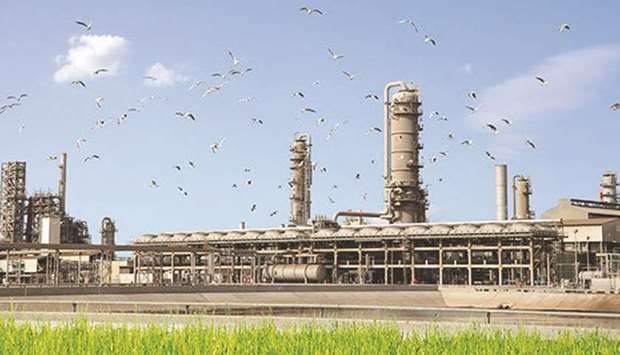Market heavyweight Industries Qatar (IQ) – one of the region’s industrial giants with holdings in petrochemicals, fertilisers and steel producers – has reported a net profit of QR951mn on revenues of QR8bn, translating as earnings per share of QR0.16 in the first nine months of this year.
Although financial performance was impacted year-on-year; IQ's operations remained “robust and resilient” with production across the group remaining “stable”.
Total production fell 6% to 12mn metric tonnes, mainly driven by periodic planned maintenance, unplanned shutdowns and moth-balling of certain steel facilities. This was partially offset by the additional production volumes related to Qafco’s 25% stake acquisition, effective January 1, 2020.
There were no major plant stoppages due to any demand related reasons, except for a planned shutdown of MTBE (methyl tert-butyl ether) facilities for 57 days during the second quarter of this year due to commercial reasons.
The MTBE facilities is now back in operations, where, the impact to the group in relation to temporary shutdown of MTBE facilities has remained immaterial, considering its overall contribution to the group volumes.
"As an immediate priority, following the unprecedented headwinds affecting our business, we further emphasised our optimisation drive across the segments and implemented new optimisation measures during the year," said HE Saad bin Sherida al-Kaabi, Minister of State for Energy Affairs and IQ chairman and managing director.
When considering the profitability of the group including 25% of Qafco’s profits, the net profit (normalised profits) for the period would reach to QR1.1bn, down 48% compared to QR2bn for the same period last year.
The EBITDA (earnings before interest taxes depreciation and amortisation) for the period reached QR2.6bn compared to QR3.2bn for the same period of last year.
The year-to-date financial performance was impacted by several factors including the pandemic, weaker crude prices and a notable decline in product demand owing to weaker GDP (gross domestic product) growth, lack of infrastructure investments and subdued consumer and industrial participation.
These adverse conditions directly translated into declining commodity prices, where blended selling prices declined by 10% versus last year, translating into a reduction of QR0.9bn in the group earnings (normalised).
Group sales volumes declined by 20%, driven by various reasons including weaker demand, lower production on account of facilities’ mothballing in the steel segment and periodic planned and unplanned maintenance.
The petrochemicals segment remained under pressure, which remained closely correlated to crude oil trends, as the segment’s performance was affected by lower product prices and weaker demand associated with lower consumption, due to lockdown situation in key markets linked to Covid-19 pandemic, especially in the first half of 2020. Accordingly, net profits declined by 38% to QR624mn and revenues by 18% to QR2.7bn.
Fertiliser segment reported a net profit of QR 453.1mn, with a decline of 25% compared to last year. Selling prices were down last year by 11% partly due to lower weak seasonal demand which outweighed the gradual easing of supply side bottlenecks.
The steel segment also remained vulnerable to economic uncertainties as there were postponements of infrastructure and capital expenditure projects due to weaker fiscal outlook. The steel segment reported a net loss of QR1.4bn against a net profit of QR158mn for the same period last year.
The group’s financial position continues to remain robust despite several macro-economic headwinds, with the liquidity reaching QR8.86bn in cash and bank balances, after accounting for a QR2.4bn dividend payment for 2019 and cash paid for the Qafco transaction (net of cash acquired along with acquisition).
Currently, the group has no debt obligations. Group’s total assets and total equity reached QR35.2bn and QR32.9bn, respectively, as on September 30, 2020.
During the period, the group generated positive operating cash flows of QR2.5bn, with a free cash flow of QR2.18bn.
IQ’s ability to generate positive operating cash flows in such distressed market conditions is a testament to group’s efficient cash flow generation capabilities, effective cost structure and robust working capital management, which could safeguard it against any unexpected adversities.

